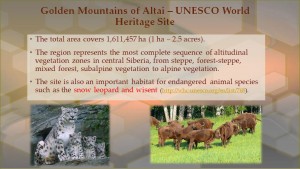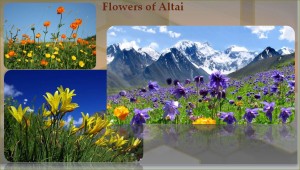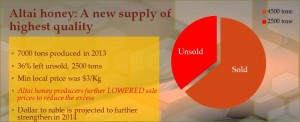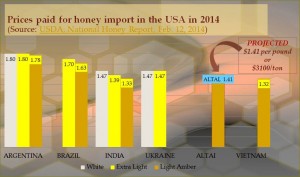Elite Altai Honey
Let me present this new reliable source of unaltered raw honey to you. The brand of Altai Honey has been known for centuries within Russia. Now the honey which is collected in ecologically clean area of Altai Mountains starts spreading beyond the borders. The area is recognized by UNESCO as a World Heritage Site known as Golden Mountains of Altai.
Currently, Polyfloral (wildflower) and Buckwheat honeys are available. White and red clovers, Zmeegolovnik, Sage, Cornflower blue, Angelica and other nectar sources are among predominant ingredients in Polyfloral Altai honey. A variety of unique types of monofloral honeys is also available during harvest season from May to October at a reasonably higher prices. The honey is packed into standard 55 gallon (300 Kg) food-grade barrels.
Typically, these highest quality bio-active honeys show outstanding Diastase Numbers and excellent other parameters given below as an example:
- Diastase number 47
- Max moisture 17%
- Reducing sugar 89%
- Hydroxymethylfurfural not detected
- Acidity 1.2
Besides amazing taste and aroma, Altai honey has extraordinary healing properties known to local people since ancient times. Altai honey is a unique product, so now it is in demand not only in Russia, but the sales start to increase in Europe, USA and Canada. This is due to the amazing environmental features of the Altai region, where the honey is produced. Pure mountain air, almost untouched nature, vast meadows and ancient traditions in the honey production are the conditions which make Altai honey distinctive from many other types. Scientists attribute the fine qualities Altai honey to huge variety of nectar giving plants, especially those that grow in the foothills of the Altai. As a consequence, Altai honey is rich in digestible monosaccharides, complex of vitamins, active enzymes (e. g., diastase), antioxidants, as well as substances with antibacterial properties. Altai honey also has a whole set of trace elements. The uniqueness of natural chemical composition makes Altay honey an excellent mean to increase immunity, it does produce tonic effect needed for the body when cold time of the year to help fighting colds, bronchitis.
You may add Altai honey to warm milk or tea, which will provide a nice drink tonic effect, supply vitamin C and can not only reduce the severity of the disease, but also assist in the healing process. If bronchitis accompanied by a cough, the doctor may recommend plenty of warm drink which can be brewed with a special collection of herbs and added honey. Besides, Altay honey is a great sweet medicine for disease prevention. However people who are allergic to honey or other bee products, should consult with their doctor first.
Nectar sources: Flowers of Altai
Due to the dry climate, most flowers are small, colorful flowers on bushes. The blue aromatic flowers of the Caryopteris, or Blue Mist, is the most common. Other common flowers are the Edelweiss, a white star-shaped flower, and the Geranium, a mountain flower found in many different colors. There are 974 plant species, of which 60 are found no where else. These include 26 species of orchids and 35 ferns. A number of common nectar supplying flowers are listed below.
Some other nectar sources are as follows:
- White and red clovers
- Zmeegolovnik
- Sage
- Wild raspberry
- Ground elder
- Cow parsnip
- Cornflower blue
- Angelica
- Sainfoin
- Melilot
- Burnet
- Epilobium
Altai honey supply and expectations
It is estimated that over 7000 tons of raw honey have been produced by Altai beekeepers. Only 4500 tons (64%) were reportedly sold mostly domestically in Russia while 2500 tons (36%) of the honey left unsold. Local sale prices were in the range of $2.60 – $3.00/Kg ($1.16 – $1.36) in 2013.
In the year of 2014 they expect even larger harvest due to warmer weather which caused local bees to start collecting honey a month earlier than normal. One can expect that the abundance of honey produced would drive prices even further down to make it more attractive source to be considered by the US importers.
Altai honey and the US import
According to February 2014 USDA report Honey Report_Feb 2014, prices paid to US importers (Ex-dock) were in the range of $1.80 (Argentina) – $1.32 (Vietnam).
Taking into account the above prices, Altai honey priced at $1.41 per pound of (i. e. $3100 per ton. NOTE: price is subject to change) looks pretty reasonable. Well, perhaps it wouldn’t take you too long at a taste-test party with your friends to come to realization that organoleptic properties of Altai honey make this product deserving higher price. Attention: SAMPLES are available in the USA. But despite its unmatched quality, Altai honey is still a new product on the American market.
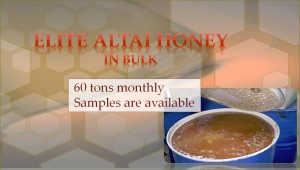 First thing is first; we do closely work with a number of leading Altai honey producers in order to organize a steady supply of high quality honey which would continuously match HACCP and Codex Alimentarius quality requirements.
First thing is first; we do closely work with a number of leading Altai honey producers in order to organize a steady supply of high quality honey which would continuously match HACCP and Codex Alimentarius quality requirements.

